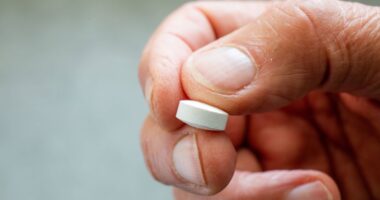A doctor has revealed a dietary plan that could “completely reverse” type 2 diabetes.
Unhealthy diet is a well-known driver for high insulin levels and insulin resistance – problems that underlie the onset of type 2 diabetes.
Fortunately, countless research has proven that exercise can help improve insulin sensitivity, making physical activity essential for diabetes control.
However, Dr Mike Hansen explained that a popular eating regimen, known as intermittent fasting, is comparable to exercise when it comes to insulin sensitivity.
There are many different approaches to this diet, but it essentially requires you to not eat for a period of time each day or week.
Some popular approaches include the 5:2 fast, where you eat a normal diet five days a week and fast two days a week, or daily time-restricted fasting, where you eat normally but only within an eight-hour window each day.
Speaking on his YouTube channel, Dr Hansen said: “In fact, when you look at the biochemistry, and the physiology, and the health benefits of exercise and compare that to intermittent fasting, they’re virtually identical. Both of these stimulate autophagy, where the cell repairs itself.
“And both of these stimulate mitophagy, where the mitochondria are replenished. Cells increase the number and size of mitochondria when people exercise and they do intermittent fasting. Either one, but especially synergistically.
“You’re only as healthy as your mitochondria and that’s really what it boils down to.”
Don’t just take the doctor’s word for it, as the latest research, published in The Journal of Clinical Endocrinology and Metabolism, found that intermittent fasting “completely reverses” type 2 diabetes.
Looking at a total of 72 people between the ages of 38 and 72 with type 2 diabetes, the research team divided the participants into two groups. One went into a control and the other had to do intermittent fasting.
The primary outcome of the research was diabetes remission, so the research team wanted to see if this popular diet could reverse diabetes after stopping all diabetic medication. They also did a 12-month follow up to assess the continuation of remission.
The findings revealed that 17 out of the 36 participants in the fasting group achieved diabetes remission, compared to just one person in the control group.
Commenting on the study, Dr Hansen also noted that almost 90 percent of participants, including those who were taking anti-diabetes medication or insulin, reduced their diabetes medication requirements after following the popular diet.
The medical expert explained that intermittent fasting is “highly effective” in restoring the cell’s ability to respond to insulin, making it more sensitive, thereby reducing your risk of diabetes and even reversing type 2 diabetes in some cases.
“Even for those who won’t exercise or can’t exercise, intermittent fasting can still improve and normalise their ability to keep glucose and insulin levels within normal limits,” he said.
The doctor concluded that it’s well-known that a healthy diet and regular exercise improve insulin sensitivity and decrease insulin levels. He added: “Now, we have evidence that intermittent fasting can do the same and even reverse type 2 diabetes.”










